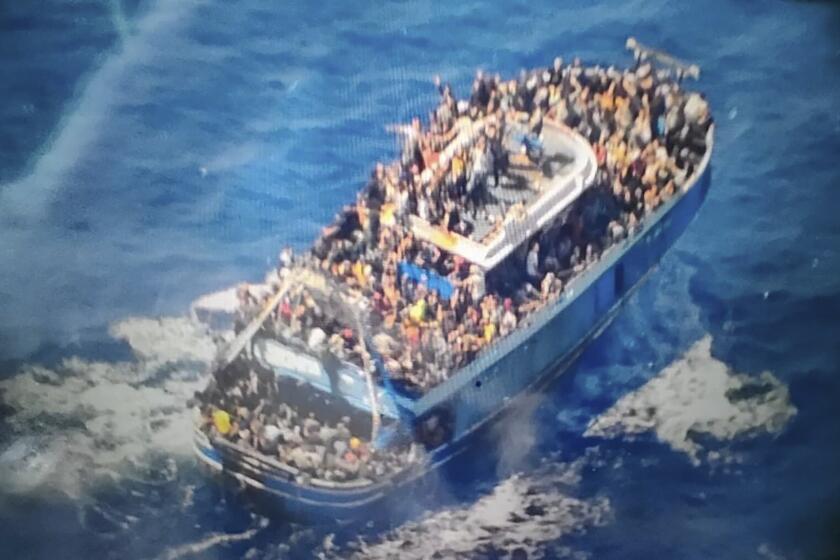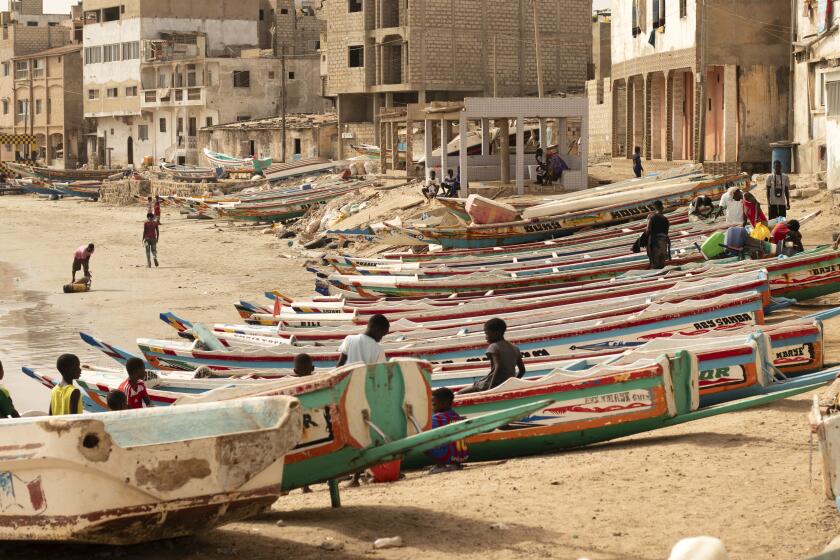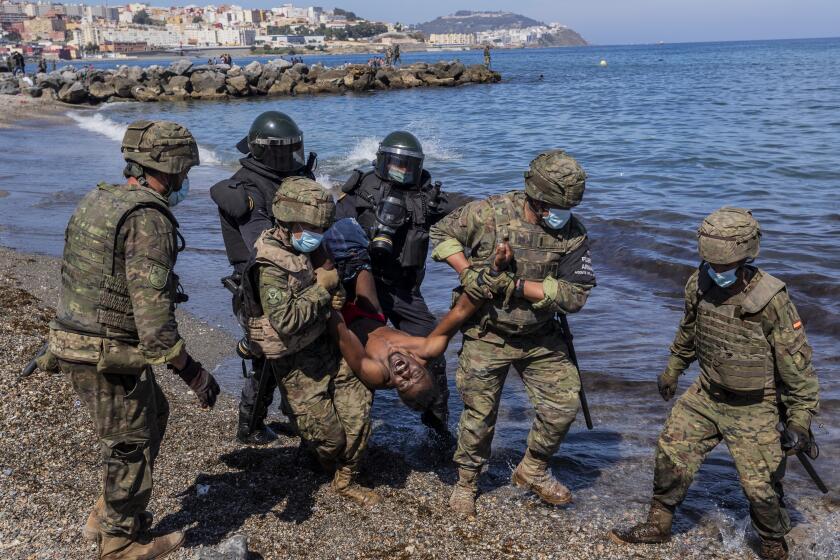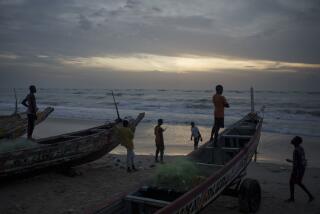Record number of migrants arrived this year in Spain’s Canary Islands, most from Senegal
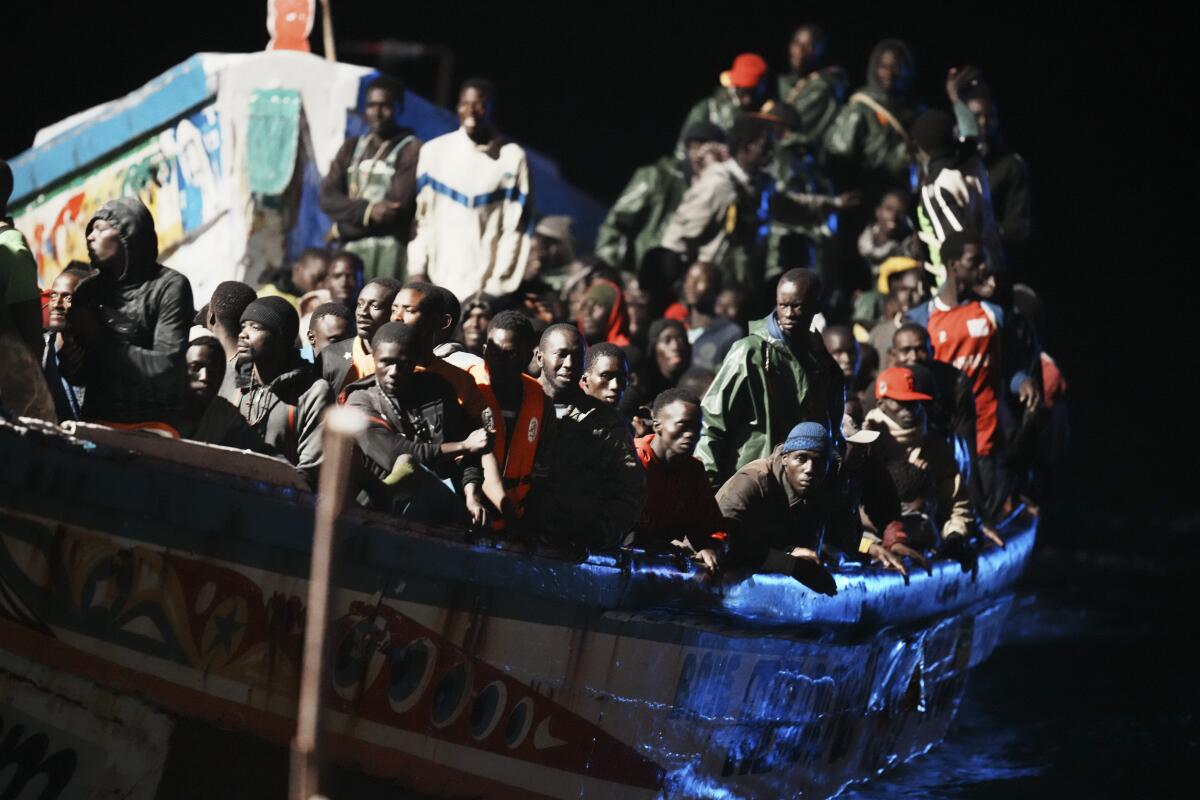
- Share via
BARCELONA, Spain — A record number of migrants have made the treacherous boat journey on the Atlantic Ocean to Spain’s Canary Islands this year, and most of the 32,000 people are coming from Senegal.
The islands, off West Africa, have been used for decades as a stepping stone to Europe. Boats also depart from Gambia, Mauritania, Morocco and Western Sahara.
According to an Associated Press tally of figures released by Spain’s Interior Ministry and local emergency services, at least 32,029 people landed on the Canary Islands from Jan. 1 to Sunday. That exceeds the migration crisis of 2006, when 31,678 migrants disembarked.
Smugglers in Senegal pack young people looking for better opportunities in Europe into old artisanal fishing boats, charging them around 300,000 CFA francs ($490). The journey from Senegal to the Canaries usually takes a week of difficult upwind sailing for around 1,000 miles.
Migrant boats frequently shipwreck or disappear in the Atlantic.
According to a migrant aid group in Spain, the migrants were traveling in three boats along one of the deadliest sea routes for migrants.
To avoid border controls, smugglers take longer journeys, navigating west into the open Atlantic before continuing north to the Canaries — a detour that brings many to the tiny westernmost El Hierro island, at times overwhelming local authorities and emergency services.
Once a beacon of democratic stability in West Africa, Senegal has seen sociopolitical unrest with violent clashes earlier this year. President Macky Sall’s embattled government has dissolved Ousmane Sonko’s opposition party, popular among young voters.
A lack of jobs, the rising cost of living, depleting fishing stocks and poor healthcare are some of the reasons pushing thousands to leave Senegal for Spain, said Saliou Diouf, a Senegalese migrants’ rights activist and founder of the association Boza Fii.
The political crisis and crackdown on the opposition have extinguished any remaining hope young people had of a better future at home, Diouf added.
“They are looking for a way out,” he said. “They no longer trust the system.”
More than 60 migrants are feared dead after a Spanish fishing vessel off the Atlantic island of Cape Verde rescued a boat that set out a month ago.
Their journey is one of the longest and most dangerous to Europe. At least 512 people have died so far this year, according to the International Organization for Migration, though the figure is believed to be a vast undercount.
Diouf, who documents cases of missing migrants, says it’s impossible to know how many people have died because of the lack of information and transparency. Many migrants are not deterred by reports of shipwrecks, he said. They see those who make it and want to try their luck too.
While Senegalese migrants often struggle to obtain the necessary work and residency permits to stay in Spain, many eventually find ways to make a living in European cities or rural farmlands. When they do, the remittances they send home make a huge difference in their families’ lives.
Faced with the record number of arrivals this year, Spain’s Interior Minister Fernando Grande-Marlaska flew to the Senegalese capital of Dakar last week to press the government to do more to stop boats from leaving.
Grande-Marlaska urged his Senegalese counterpart, Sidiki Kaba, to “act more quickly” and avoid more deaths.
An unprecedented 8,000 people have streamed into the Spanish city of Ceuta from Morocco in the past two days, straining ties between Madrid and Rabat.
“We agreed that we must combat irregular immigration with force,” Kaba said, acknowledging irregular migration as a “huge challenge” for Spain, Senegal and the European Union.
Spain has nearly 40 police and civil guard officers, four boats, a helicopter and an aircraft deployed in Senegal to monitor the country’s more than 310-mile coast and crack down on smuggling networks in collaboration with local authorities.
Madrid says the joint effort has successfully stopped 7,132 people from leaving Senegal this year.
During the 2006 “cayucos crisis” — named after the large canoe-shaped boats from Mauritania and Senegal often used by smugglers — Spain signed agreements with 10 African countries for them to accept returned migrants and stop new boats from leaving.
In the following years, arrivals to the Canary Islands declined and had been largely manageable until they spiked again in 2020 as a result of increased surveillance along the favored Mediterranean Sea route, among other factors.
Associated Press writer Babacar Dione in Dakar, Senegal, contributed to this story.
More to Read
Sign up for Essential California
The most important California stories and recommendations in your inbox every morning.
You may occasionally receive promotional content from the Los Angeles Times.
